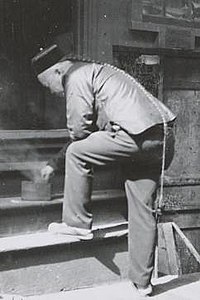Queue (hairstyle)
| Queue | |||||||||||||||

Chinese American man with queue in San Francisco's Chinatown
|
|||||||||||||||
| Chinese name | |||||||||||||||
|---|---|---|---|---|---|---|---|---|---|---|---|---|---|---|---|
| Traditional Chinese | 辮子 | ||||||||||||||
| Simplified Chinese | 辫子 | ||||||||||||||
|
|||||||||||||||
| Alternative Chinese name | |||||||||||||||
| Traditional Chinese | 頭鬃尾 or 毛尾仔 | ||||||||||||||
|
|||||||||||||||
| Manchu name | |||||||||||||||
| Manchu script | |||||||||||||||
| Romanization | soncoho | ||||||||||||||
| Transcriptions | |
|---|---|
| Standard Mandarin | |
| Hanyu Pinyin | biànzi |
| Yue: Cantonese | |
| Jyutping | bin1 zi2 |
| Southern Min | |
| Hokkien POJ | pīⁿ-á (辮仔) |
| Transcriptions | |
|---|---|
| Southern Min | |
| Hokkien POJ | mn̂g-bué-á/mn̂g-bé-á or thâu-chang-bué/thâu-chang-bé |
The queue or cue is a hairstyle most often worn by men. Hair on top of the scalp is grown long and is often braided, while the front portion of the head is shaved. It was worn by the Manchu people of Manchuria, certain indigenous American groups and Gopis (devotees of Krishna). Some early modern military organizations have also used similar styles.
The requirement that Han Chinese and others under Manchu rule give up their traditional hairstyles and wear the queue was met with resistance, although opinions about the queue did change over time.
Jurchen men, like their Manchu descendants, wore their hair in queues. In 1126, the Jurchen ordered male Han within their conquered territories to adopt the Jurchen hairstyle by shaving the front of their heads and to adopt Jurchen dress, but the order was lifted. Some Han rebels impersonated Jurchen by wearing their hair in the Jurchen "pigtail" to strike fear within the Jurchen population.
The queue was a specifically male hairstyle worn by the Manchu people from central Manchuria and later imposed on the Han Chinese during the Qing dynasty. The hair on the front of the head was shaved off above the temples every ten days and the remainder of the hair was braided into a long braid.
The Manchu hairstyle was forcefully introduced to Han Chinese in the early 17th century during the Manchu conquest of China. Nurhaci of the Aisin Gioro clan declared the establishment of the Later Jin dynasty, later becoming the Qing dynasty of China, after Ming dynasty forces in Liaodong defected to his side. The Ming general of Fushun, Li Yongfang, defected to Nurhaci after Nurhaci promised him rewards, titles, and Nurhaci's own granddaughter in marriage. Other Han Chinese generals in Liaodong proceeded to defect with their armies to Nurhaci and were given women from the Aisin Gioro family in marriage. Once firmly in power, Nurhaci commanded all men in the areas he conquered to adopt the Manchu hairstyle.
...
Wikipedia
